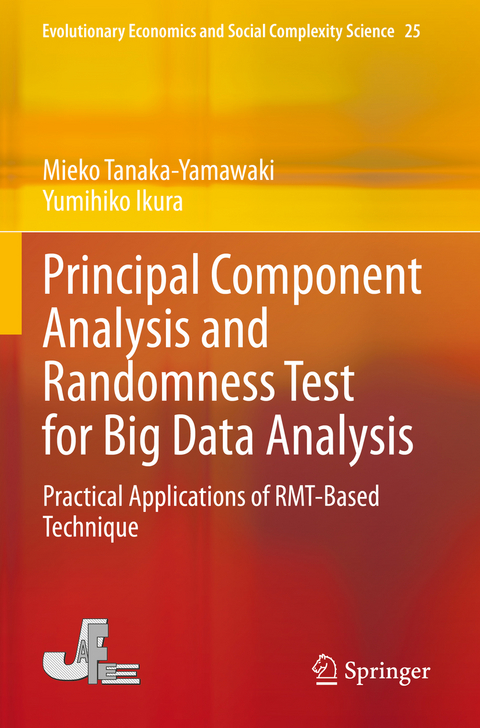
Principal Component Analysis and Randomness Test for Big Data Analysis
Practical Applications of RMT-Based Technique
Seiten
2024
|
2023 ed.
Springer Verlag, Singapore
978-981-19-3969-3 (ISBN)
Springer Verlag, Singapore
978-981-19-3969-3 (ISBN)
This book presents the novel approach of analyzing large-sized rectangular-shaped numerical data (so-called big data). The essence of this approach is to grasp the "meaning" of the data instantly, without getting into the details of individual data. Unlike conventional approaches of principal component analysis, randomness tests, and visualization methods, the authors' approach has the benefits of universality and simplicity of data analysis, regardless of data types, structures, or specific field of science.
First, mathematical preparation is described. The RMT-PCA and the RMT-test utilize the cross-correlation matrix of time series, C = XXT, where X represents a rectangular matrix of N rows and L columns and XT represents the transverse matrix of X. Because C is symmetric, namely, C = CT, it can be converted to a diagonal matrix of eigenvalues by a similarity transformation SCS-1 = SCST using an orthogonal matrix S. When N is significantly large, the histogram of the eigenvalue distribution can be compared to the theoretical formula derived in the context of the random matrix theory (RMT, in abbreviation).
Then the RMT-PCA applied to high-frequency stock prices in Japanese and American markets is dealt with. This approach proves its effectiveness in extracting "trendy" business sectors of the financial market over the prescribed time scale. In this case, X consists of N stock- prices of length L, and the correlation matrix C is an N by N square matrix, whose element at the i-th row and j-th column is the inner product of the price time series of the length L of the i-th stock and the j-th stock of the equal length L.
Next, the RMT-test is applied to measure randomness of various random number generators, including algorithmically generated random numbers and physically generated random numbers.
The book concludes by demonstrating two applications of the RMT-test: (1) a comparison of hash functions, and (2) stock prediction by means of randomness, including a new index of off-randomness related to market decline.
First, mathematical preparation is described. The RMT-PCA and the RMT-test utilize the cross-correlation matrix of time series, C = XXT, where X represents a rectangular matrix of N rows and L columns and XT represents the transverse matrix of X. Because C is symmetric, namely, C = CT, it can be converted to a diagonal matrix of eigenvalues by a similarity transformation SCS-1 = SCST using an orthogonal matrix S. When N is significantly large, the histogram of the eigenvalue distribution can be compared to the theoretical formula derived in the context of the random matrix theory (RMT, in abbreviation).
Then the RMT-PCA applied to high-frequency stock prices in Japanese and American markets is dealt with. This approach proves its effectiveness in extracting "trendy" business sectors of the financial market over the prescribed time scale. In this case, X consists of N stock- prices of length L, and the correlation matrix C is an N by N square matrix, whose element at the i-th row and j-th column is the inner product of the price time series of the length L of the i-th stock and the j-th stock of the equal length L.
Next, the RMT-test is applied to measure randomness of various random number generators, including algorithmically generated random numbers and physically generated random numbers.
The book concludes by demonstrating two applications of the RMT-test: (1) a comparison of hash functions, and (2) stock prediction by means of randomness, including a new index of off-randomness related to market decline.
Mieko Tanaka-Yamawaki, former professor, Tottori University Yumihiko Ikura, Meiji University
Big Data Analysis by Means of RMT-Oriented Methodologies.- Formulation of the RMT-PCA.- RMT-PCA and Stock Markets.- The RMT-test: New Tool to Measure the Randomness of a Given Sequence.- Application of the RMT-test.- Conclusion.- Appendix I: Introduction to vector, inner product, correlation matrix.- Appendix II: Jacobi’s rotation algorithm.- Appendix III: Program for the RMT-test.- Appendix IV: RMT-test applied on TOIPXcore30 index time series in 2014.- Appendix V: RMT-test applied on TOIPX index time series in 2011-2014.
| Erscheinungsdatum | 26.05.2024 |
|---|---|
| Reihe/Serie | Evolutionary Economics and Social Complexity Science |
| Zusatzinfo | 1 Illustrations, black and white; VII, 152 p. 1 illus. |
| Verlagsort | Singapore |
| Sprache | englisch |
| Maße | 155 x 235 mm |
| Themenwelt | Mathematik / Informatik ► Informatik ► Datenbanken |
| Wirtschaft ► Allgemeines / Lexika | |
| Wirtschaft ► Volkswirtschaftslehre | |
| Schlagworte | Big data analysis • Evaluation of Random Number Generators • RMT-PCA • RMT-Test • Trendy Sectors of the Stock Market |
| ISBN-10 | 981-19-3969-1 / 9811939691 |
| ISBN-13 | 978-981-19-3969-3 / 9789811939693 |
| Zustand | Neuware |
| Informationen gemäß Produktsicherheitsverordnung (GPSR) | |
| Haben Sie eine Frage zum Produkt? |
Mehr entdecken
aus dem Bereich
aus dem Bereich
Einführung in die Praxis der Datenbankentwicklung für Ausbildung, …
Buch | Softcover (2021)
Springer Fachmedien Wiesbaden GmbH (Verlag)
CHF 69,95


